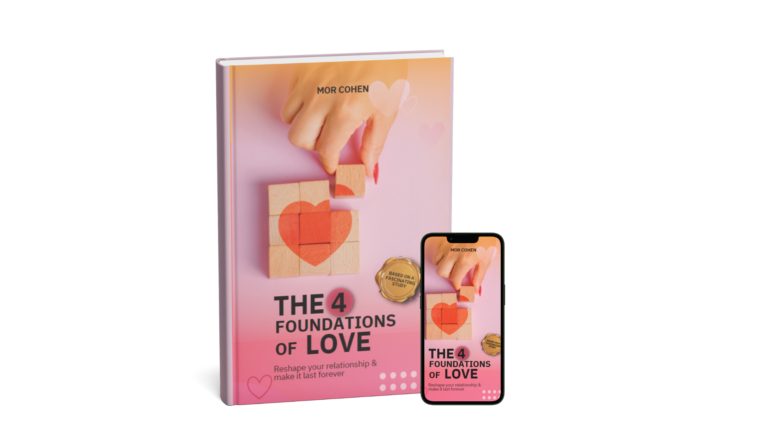Overcoming Heartbreak: Tips for Emotional Healing

A breakup can feel like the end of the world, but it’s also an opportunity to rebuild yourself, emotionally and mentally. Emotional healing after a breakup requires time, patience, and the willingness to address deep emotional wounds. Instead of repressing pain, it's important to acknowledge and process your feelings to move forward. In this guide, we will explore effective strategies for overcoming heartbreak, rooted in emotional healing, self-care, and personal growth.
Recognizing and Acknowledging Pain
One of the most vital steps in emotional healing after a breakup is accepting that pain is a natural, inevitable response. Emotions such as sadness, grief, and heartache are part of the healing process, and confronting them head-on is crucial.
In Kabbalah, the concept of emotional healing is deeply intertwined with the idea of tikkun (תיקון), which translates to "correction" or "spiritual repair." According to this spiritual philosophy, the emotional pain that arises from life’s difficult moments—such as a breakup—should not be avoided. The teachings emphasize that by fully experiencing and processing our pain, we engage in a journey of spiritual refinement and growth. Ignoring pain, according to Kabbalah, only leads to its amplification over time. The lesson here is that emotional suffering carries a deeper spiritual significance, guiding us toward the correction of our soul and the elevation of our consciousness.
Facing grief and sadness directly allows for soul purification—a fundamental aspect of the human journey. By allowing ourselves to feel the full intensity of our emotions, we open the door to tikkun and the spiritual repair that comes from learning the lessons embedded in the pain. This reflective process can lead to personal transformation, helping us to not only heal emotionally but to advance on a spiritual level as well.
From a psychological perspective, modern research complements this ancient wisdom. Psychologist Dr. Guy Winch, in his book "Emotional First Aid: Healing Rejection, Guilt, Failure, and Other Everyday Hurts" , explains that avoiding emotional pain can lead to deeper suffering. Suppressing emotions may initially seem easier, but it only prolongs the healing process. Winch stresses the importance of treating emotional injuries with the same urgency as physical wounds. Recognizing the pain allows for greater emotional clarity and sets the stage for long-term recovery.
Both Kabbalah and modern psychology highlight that attempting to “move on” too quickly without fully processing emotions can result in unresolved issues resurfacing later. Methods such as journaling, discussing your feelings with trusted individuals, or engaging in creative outlets can serve as effective ways to cope. Research from the American Psychological Association shows that expressing emotions—whether through writing or verbal communication—facilitates both emotional and cognitive healing. By giving voice to your emotions, you allow yourself to process the pain more fully and effectively.
In both spiritual and psychological contexts, embracing emotional pain is seen not as a weakness but as an opportunity. It provides the chance for self-awareness, growth, and ultimately, healing. This process not only helps in overcoming the immediate suffering of a breakup but also serves to correct deeper emotional and spiritual imbalances that may have existed within the relationship itself.
Buildig Resilience and Emotional Healing
Resilience is your ability to bounce back from difficult situations. According to positive psychology research, resilience isn’t something people are born with—it’s developed through experience and emotional work. The work of Dr. George A. Bonanno, a clinical psychologist and researcher of trauma and grief, focuses on resilience as a key factor in overcoming emotional setbacks. In his research, Bonanno emphasizes that most people have an innate ability to recover from loss, even severe emotional trauma, given the right support systems and personal commitment to healing. You can explore his research further at the Loss, Trauma, and Emotion Lab.
One of the most effective ways to build resilience is through mindfulness and meditation. Studies from institutions like Harvard Medical School have shown that mindfulness-based stress reduction (MBSR) techniques improve emotional regulation and decrease the impact of negative emotions. By practicing mindfulness, individuals can become more aware of their emotions without being overwhelmed by them, making it easier to navigate through the pain of a breakup.
For additional insights, Dr. Bonanno’s book "The End of Trauma" delves into how most people are naturally resilient and how emotional flexibility helps people cope with trauma more effectively. His decades of research challenge the common assumption that traumatic experiences inevitably lead to Post-Traumatic Stress Disorder (PTSD), offering a more hopeful outlook on human resilience.
Self-Love and Self-Care as Essential Tools
Self-care is not just about treating yourself to relaxing activities but about taking steps to ensure emotional well-being. After a breakup, it's essential to reconnect with yourself, rediscover your interests, and nurture your emotional needs. The concept of self-love is critical in this process. As Brené Brown, a research professor at the University of Houston, points out in her book "The Gifts of Imperfection", self-love allows us to show compassion toward ourselves during times of emotional distress. Brown’s research highlights that practicing self-love makes individuals more resilient and able to cope with emotional hardship, helping them find meaning in their experiences.
Building a self-care routine can include daily mindfulness exercises, physical activity, and focusing on hobbies that bring joy and fulfillment. Studies have repeatedly shown that exercise helps reduce the symptoms of depression and anxiety, both of which often accompany heartbreak. Regular physical activity releases endorphins, the body's natural "feel-good" chemicals, which can enhance your mood and help you cope better with the stress of a breakup.
Forgiveness and Letting Go
One of the hardest parts of moving on from a relationship is learning to let go. Letting go doesn’t mean forgetting the relationship or pretending it didn’t matter; rather, it means accepting that it is over and understanding that holding onto anger or sadness will only prolong your suffering. Dr. Fred Luskin, a researcher at Stanford University, has dedicated his career to studying forgiveness. In his book, "Forgive for Good", Luskin argues that forgiveness is a powerful tool for emotional healing, particularly after a painful breakup. He defines forgiveness not as condoning the hurt but as freeing yourself from the emotional hold that the person has over you.
Luskin’s research shows that people who actively practice forgiveness experience lower levels of stress and depression, allowing them to move forward without carrying the emotional weight of the past. Forgiveness, in this context, is about releasing the pain caused by the relationship and reclaiming emotional freedom.
The Unwritten Agreement: A Key Insight
According to Mor Cohen's research in The 4 Foundations of Love, many relationships are shaped by unspoken agreements between partners—expectations that are rarely vocalized but deeply felt. When these unwritten agreements break, it often leads to confusion, disappointment, and eventually, the end of the relationship. Recognizing these unspoken expectations and understanding how they contributed to the breakup can offer valuable insights for future relationships. Cohen explains: "Each couple, whoever they may be, has their own unwritten agreement. However, the successful couples I have met have a unique unwritten agreement, which to put in a sentence is—'There is no doubt that my partner loves me and would do anything for me.'” This sense of trust and certainty is often what differentiates lasting relationships from those that fail.
Breakups aren't just about what happened externally but are often the result of deeper, unacknowledged patterns in how we relate to one another. By uncovering and addressing these hidden dynamics, you can begin to heal, and even reignite, the relationship.

The 4
What makes a couple stay together and feel they have found the one? What makes a random encounter exceptional? How can you know if you have chosen the right person? How can you avoid wasting precious time? And how you can get your ex back?
The guide “The 4 Foundations of Love” is based on a fascinating study, in which a great number of successful couples were interviewed for one purpose: to capture the essence of their unique relationship – what makes them keep loving their partner years after they have met, or even love them more. According to an NLP model, these couples share the following 4 crucial foundations:
- RARENESS – the moment of realization that this is our destined partner.
- UNWRITTEN AGREEMENT – the essence of words used instinctively and their impact on the quality of the relationship.
- SACRED BOND – the relationship’s sacred element and the couple’s divine connection.
- FUTURE DIMENSION – the promise of a mutual future.
Hundreds of women who have implemented this method in their relationships, have claimed that it has restored their sense of confidence and control, created intimacy and power, and elevated their relationship to a unique level of spirituality. Thus, you can reshape your relationship and take to it the next level with joy and ease: without overbearing conversations, without trying to convince your partner, without games, and without waiting for your partner’s cooperation.

Mor Cohen
The author is a researcher and entrepreneur in the medical field. She has an M.Sc.Med and MBA, as well as being a qualified NLP therapist, assisting couples overcoming breakups and relationship crises.
Identifying and mapping the four foundations, is a focal tool the author has used in her work with hundreds of women going through a relationship crisis, looking to rectify their relationship status.
Applying the method with these women, showed that couples who already had the four elements (even if their needed strengthening) could easily reconnect and rectify their relationship. However, couples who didn’t have these elements, were more inclined to breakup, disconnect and move on.
In this book, the author describes the possibility of predicting the continuation of a relationship according to the existence and strength of these foundations. It also describes how prepare the ground for establishing them, to ensure your relationship becomes eternal.
